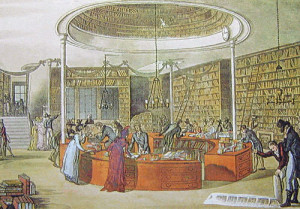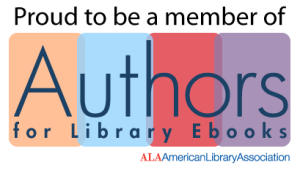Aren’t we lucky that books are so available to us? Today we have so many choices. Hardback books, paperback books, ebooks. We can buy books online, in mega-bookstores, small independent bookstores, stores like Target and Walmart, even grocery stores. And we can borrow books from libraries.
 The invention of the printing press paved the way for making books available to more than the rare few, but even three hundred years later, during the Regency, only the wealthy could afford to buy books. A book in three volumes could cost almost one hundred dollars in today’s dollars. Books were much more affordable when lent from the circulating libraries that abounded in every English city and village.
The invention of the printing press paved the way for making books available to more than the rare few, but even three hundred years later, during the Regency, only the wealthy could afford to buy books. A book in three volumes could cost almost one hundred dollars in today’s dollars. Books were much more affordable when lent from the circulating libraries that abounded in every English city and village.
Some were as large and well-stocked as Hookham’s on Bond Street. Others, in villages, might consist of a couple shelves of books in a dry goods shop. Subscriptions could cost a guinea a year to borrow as many books as one wished at the more expensive libraries to a few pence per book at the smaller ones.
One thing was certain at the circulating libraries of all sizes. Novels were by far the most popular books borrowed.
It is true today, as well. The most popular category of books borrowed in libraries are novels.
Today libraries are struggling to meet the needs of our changing world, especially the changing world of publishing and the effects of the economic crisis. Budgets are being cut at the same time that new technologies are becoming more and more important.
 One of the struggles involves the borrowing of ebooks. Instead of ebooks making books more accessible through libraries, the cost of ebooks, sometimes 150-500% above printed books, has made it more difficult for libraries to afford the numbers of books they might have stocked on bookshelves. In response The American Library Association has announced the launch of “Authors for Library Ebooks,” an initiative that asks authors to stand with libraries in their quest for equitable access to e-books. Kicking off the campaign are bestselling authors Cory Doctorow, Ursula K. Le Guin and Jodi Picoult. Authors can sign on to this initiative here.
One of the struggles involves the borrowing of ebooks. Instead of ebooks making books more accessible through libraries, the cost of ebooks, sometimes 150-500% above printed books, has made it more difficult for libraries to afford the numbers of books they might have stocked on bookshelves. In response The American Library Association has announced the launch of “Authors for Library Ebooks,” an initiative that asks authors to stand with libraries in their quest for equitable access to e-books. Kicking off the campaign are bestselling authors Cory Doctorow, Ursula K. Le Guin and Jodi Picoult. Authors can sign on to this initiative here.
The ALA has been talking to major publishers, distributors, authors and agents about solutions for library ebook lending, a solution that can be fair to everyone. I think it is so important that libraries survive to offer books to those who cannot afford them and that will include ebooks more and more as epublishing grows.
What do you think?
And….Our Elena Greene is interviewed at History Hoydens today. Let’s show her some Risky Regencies support!! (and hear more about Flying With A Rogue!)
This just in! Number One London is planning a Wellington Tour! Check it out!
